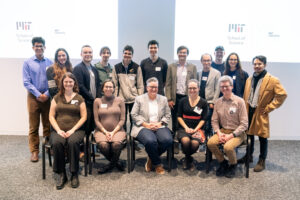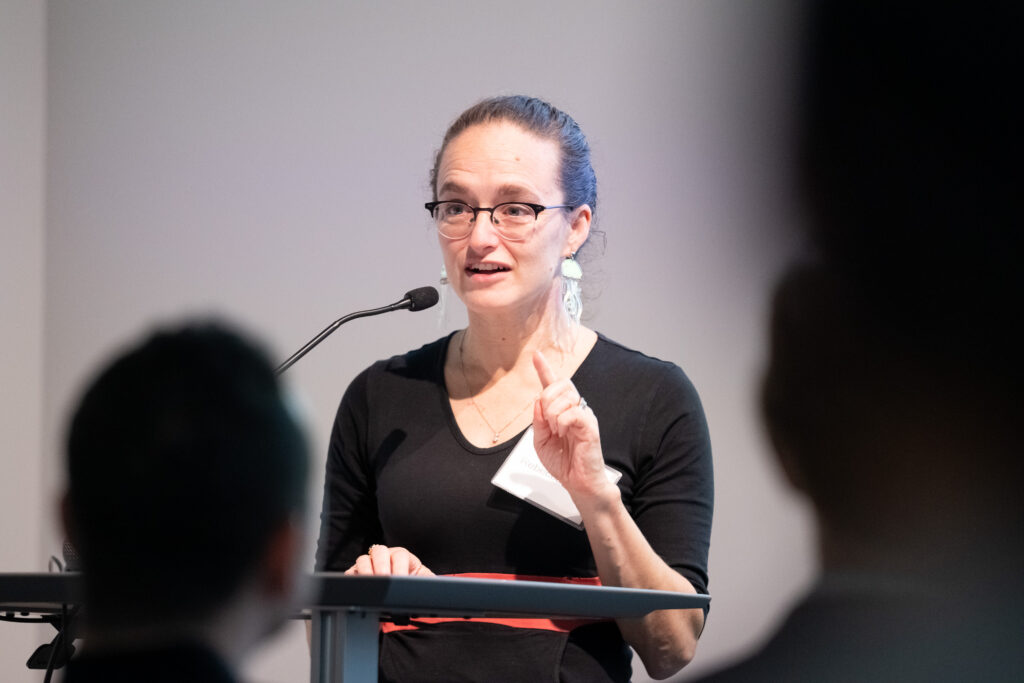Rewarding excellence in open data
MIT researchers who share their data recognized at second annual awards celebration

Director of MIT Libraries Chris Bourg (first row, center) and Associate Dean Rebecca Saxe (seated on Bourg's left) celebrate with the recent winners of the MIT Open Data Prize. Photo: Bryce Vickmark
The second annual MIT Prize for Open Data, which included a $2,500 cash prize, was recently awarded to 10 individual and group research projects. Presented jointly by the School of Science and the MIT Libraries, the prize highlights the value of open data — research data that is openly accessible and reusable — at the Institute. The prize winners and 12 honorable mention recipients were honored at the Open Data@MIT event held this past fall at Hayden Library.
Conceived by Chris Bourg, director of MIT Libraries, and Rebecca Saxe, associate dean of the School of Science and the John W. Jarve (1978) Professor of Brain and Cognitive Sciences, the prize program was launched in 2022. It recognizes MIT-affiliated researchers who use or share open data, create infrastructure for open data sharing, or theorize about open data. Nominations were solicited from across the Institute, with a focus on trainees: undergraduate and graduate students, postdocs, and research staff.
“Supporting and encouraging the next generation of researchers will help ensure that the future of scholarship is characterized by a norm of open sharing.”
“The prize is explicitly aimed at early-career researchers,” says Bourg. “Supporting and encouraging the next generation of researchers will help ensure that the future of scholarship is characterized by a norm of open sharing.” The 2023 awards were presented at a celebratory event held during International Open Access Week. Winners gave five-minute presentations on their projects and the role that open data plays in their research.

Winners were chosen from more than 80 nominees, representing all five MIT schools, the MIT Schwarzman College of Computing, and several research centers across the Institute. A committee composed of faculty, staff, and graduate students made the selections, which included the following from the School of Science:
Adam Atanas, postdoc in the Department of Brain and Cognitive Sciences (BCS), and Jungsoo Kim, graduate student in BCS, created WormWideWeb.org. The site, allowing researchers to easily browse and download
C. elegans whole-brain datasets, will be useful to C. elegans neuroscientists and theoretical/computational neuroscientists.
Undergraduate student Daniel Kurlander created a tool for planetary scientists to rapidly access and filter images of the comet 67P/Churyumov-Gerasimenko. The web-based tool enables searches by location and other properties, does not require a time-intensive download of a massive dataset, allows analysis of the data independent of the speed of one’s computer, and does not require installation of a complex set of programs.
Halie Olson, postdoc in BCS, was recognized for sharing data from a functional magnetic resonance imaging study on language processing. The study used video clips from “Sesame Street” in which researchers manipulated the comprehensibility of the speech stream, allowing them to isolate a “language response” in the brain.
Melissa Kline Struhl, research scientist in BCS, was recognized for Children Helping Science, a free, open- source platform for remote studies with babies and children that makes it possible for researchers at more than 100 institutions to conduct reproducible studies. A complete list of winning projects and honorable mentions, including links to the research data, is available on the MIT Libraries website.
Brigham Fay | MIT Libraries
This article first appeared in MIT News on November 16, 2023.